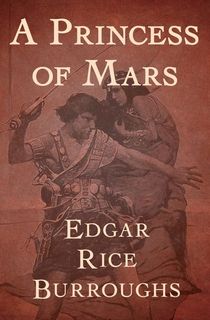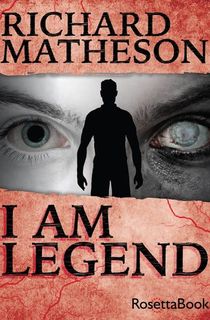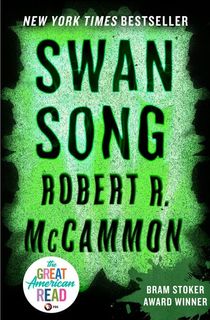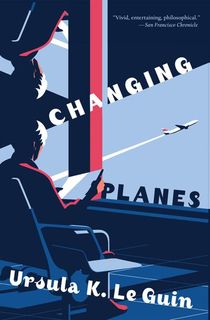Sci-fi and fantasy fans run into each other a lot at bookstores. To some people (including, apparently, a bunch of people who lay out bookstores), fantasy and sci-fi are “fantasy/sci-fi”–a double-dose of genre fiction lumped together as one.
It’s a little weird to imagine that anyone could consider The Lord of the Rings to be the same genre as Do Androids Dream of Electric Sheep?, but, to be fair, fantasy and sci-fi do share some things. They both discard the limitations of “realistic” literary fiction and embrace the fantastic. And they share a lot of fans, too.
Some books embrace the idea that sci-fi and fantasy are related genres.
It’s not unusual for authors to blend elements of the two genres into a truly hybrid works: the fantasy/sci-fi partnership has given us space operas with mystical elements (looking at you, Star Wars), medieval-esque fantasy set on other planets or in other universes (The Barsoom series, anyone?), and many other specialized cocktails of genre-fiction goodness.
Today, we’re celebrating a few of the best genre-bending books ever to toe the line between science fiction and fantasy.

A Princess of Mars
Burroughs’ pulp fiction classic is one of the best examples of the ways in which science fiction and fantasy can work together.
Burroughs’ fictional world is full of swords and sorcery, but it also uses scientific explanation (extremely bogus ones, of course) for its magical elements and, as the title suggests, takes place on Mars. If you like this one, good news: there’s a whole Barsoom series (in the books, “Barsoom” is the Martian–er, sorry, “Barsoomian”–word for “Mars”).

2001: A Space Odyssey
Stanley Kubrick’s classic film 2001: A Space Odyssey is, of course, a sci-fi movie. But its refusal to conform the the science fiction norm of explaining things makes it feel strange and almost abstract. In the novel version, which Clarke and Kubrick worked at the same time as the film, the explanations are there–but they dabble in the fantastic and the paranormal, making this story partly fantasy as well as science fiction.
.jpeg?w=640)
Dune
Considered by many to be the greatest science fiction novel of all time, Frank Herbert’s Dune also dabbles in fan tasy elements.
The political focus in Dune’s world-building, with its emphasis on royal families, shifting alliances, and scheming power plays, would not be out of place in a fantasy novel. Nor would Dune’s extensive use of mystical powers like clairvoyance. Dune’s setting makes it a sci-fi novel, but its story recalls sci-fi’s sister genre.

The Gunslinger
Stephen King’s Dark Tower series is massive, so you should probably start at the beginning. This relatively thin volume introduces the basics of King’s sprawling epic, which blends elements from science fiction, fantasy, and other genres at will to create an eerie world haunted by magic and forgotten technology.
The series tells the story of a flawed and gun-toting protagonist who is hunting a magic-wielding “man in black” and, later, a “Dark Tower” in a strange world that has a mysterious relationship with our own.

I Am Legend
Some of the best blends of science fiction and fantasy can be found in another genre entirely: horror. Horror stories love to create mythical monsters and use paranormal elements, but they also share science fiction’s love of settings like remote interstellar locations and post-apocalyptic Earths.
Matheson’s famous novel mixes fantasy-horror elements with a post-apocalyptic setting very effectively as it follows a Los Angeles-based survivor of a pandemic that has transformed humans into vampire-like creatures.
RELATED: 11 Scary-Good Sci-Fi Horror Books

Swan Song
McCammon’s novel starts with a familiar idea from the genres of science fiction and horror: an apocalypse. But from there, McCammon begins to introduce more fantastic elements. The nuclear exchange that has ended civilization as we know it has also granted fantasy-like powers to at least one young woman.
The novel’s sprawling plot and the girl at its center recall the epic fantasy genre and its heroic journey motif, while its concern with the technologies of war keeps it rooted in science fiction as well.
RELATED: Westworld's "The Riddle of the Sphinx" Is the Best E2 of the Series Yet

Changing Planes
Ursula K. Le Guin is one of the greatest science fiction writers of all time.
As with Frank Herbert’s Dune, Le Guin’s best works are memorable in part because they do the fantasy-like work of building worlds that feel anthropologically rich, politically complex, and colored by hints of higher powers.
In Changing Planes, Le Guin uses the concept of different “planes” of existence to drop readers into various fantastic worlds in a series of linked short stories.
Le Guin uses sci-fi staples like alien races and pseudoscientific explanations to explain imaginings that are often more fantasy-like: immortal races and winged humanoids populate her fictional worlds, and her brief stories can feel like fairy tales or fables in the way that they change perspectives and suggest broader truths and morals.
Featured photo from "The Dark Tower: Gunslinger"


.jpeg?w=640)
